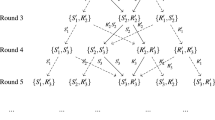Abstract
Heath and Tversky (1991, Journal of Risk and Uncertainty 4:5–28) posed that reaction to ambiguity is driven by perceived competence. Competence effects may be inconsistent with ambiguity aversion if betting on own judgement is preferred to betting on a chance event, because judgemental probabilities are more ambiguous than chance events. This laboratory experiment analyses whether ambiguity affects prices and volumes in a double auction market, and contrasts ambiguity aversion to competence effects. In order to test for the presence of competence effects, in the experiment uncertainty is tied to the realisation of events about which the decision maker is more or less knowledgeable. Two experiments are presented: in the first, knowledge is exogenous, whereas in the second the knowledge judgement is endogenous. Market prices provide evidence in favour of the competence hypothesis only when competence is self-assessed. Comparable volumes are observed in both experiments.
Similar content being viewed by others
References
Camerer C. (1987) Do biases in probability judgement matter in markets? Experimental evidence. American Economic Review 77: 981–997
Camerer C., Kunreuther H. (1989) Experimental markets for insurance. Journal of Risk and Uncertainty 2: 265–300
Camerer C., Weber M. (1992), Recent developments in modelling preferences: uncertainty and ambiguity. Journal of Risk and Uncertainty 5: 325–370
Cox J., Grether D. (1996) The preference reversal phenomenon: response mode, markets, and incentives. Economic Theory 7: 381–405
Di Mauro, C. (2005), Trading in experimental asset markets under uncertainty, mimeo.
Di Mauro, C. and Maffioletti, A. (2001), Reaction to uncertainty and market mechanisms: experimental evidence, Working Paper 01–41, SFB504, Universitat Mannheim.
Di Mauro C., Maffioletti A. (2004) Attitudes to risk and attitudes to uncertainty: experimental evidence. Applied Economics 36: 357–372
Dow J., da Costa Werlang S.R. (1992) Uncertainty aversion, risk aversion, and the optimal choice of portfolio. Econometrica 60: 197–204
Ellsberg D. (1961) Risk, ambiguity, and the Savage axiom. Quarterly Journal of Economics 75: 643–669
Epstein L.G., Wang T. (1994), Intertemporal asset pricing under Knightian uncertainty. Econometrica 62: 283–322
Epstein L.G. (2000) Are probabilities used in markets?. Journal of Economic Theory 91: 86–90
Fox C.R., Rogers B.A., Tversky A. (1996) Option traders exhibit sub-additive decision weights. Journal of Risk and Uncertainty 13: 5–17
Fox C.R., Tversky A. (1995) Ambiguity aversion and comparative ignorance. Quarterly Journal of Economics 110: 585–603
French K., Poterba J. (1991) Investor diversification and international equity markets. American Economic Review 81: 222–226
Frisch D., Baron J. (1988), Ambiguity and rationality. Journal of Behavioral Decision Making 1: 149–157
Heath C., Tversky A. (1991), Preference and belief: ambiguity and competence in choice under uncertainty. Journal of Risk and Uncertainty 4: 5–28
Huberman G. (2001) Familiarity breeds investment. Review of Financial Studies 14: 659–680
Keppe H., Weber M. (1995) Judged knowledge and ambiguity aversion. Theory and Decision 39: 51–77
Kilka M., Weber M. (2000), Home bias in international stock return expectations. Journal of Psychology and Financial Markets 1: 176–192
Kuehberger A., Perner J. (2003), The role of competition and knowledge in the Ellsberg task. Journal of Behavioural Decision Making 16: 181–191
Lei V., Noussair C., Plott C.R. (2001) Non speculative bubbles in experimental asset markets: lack of common knowledge of rationality vs. actual irrationality. Econometrica 69: 831–859
List J.A. (2004) Neoclassical theory versus Prospect theory: evidence from the marketplace. Econometrica 72: 615–625
Loomes G., Starmer C., Sugden R. (2003) Do anomalies disappear in repeated markets?. Economic Journal 113: 153–166
Mukerji S., Tallon J.M. (2001) Ambiguity aversion and incompleteness of financial markets. Review of Economic Studies 68: 883–904
Mukerji S., Tallon J.M. (2003) Ellsberg’s two-color Experiment, portfolio inertia, and ambiguity. Journal of Mathematical Economics 39: 299–315
O’Brien J., Srivastava S. (1991) Dynamic stock markets with multiple assets: an experimental analysis. Journal of Finance 46: 1811–1838
Plott C.R., Sunder S. (1982) Efficiency of experimental security markets with insider information: an application of rational-expectations models. Journal of Political Economy 90: 663–698
Porter D.P., Smith V.L. (2003) Stock market bubbles in the laboratory. Journal of Behavioral Finance 4: 7–20
Rietz, T. (1999), Enforcing arbitrage restrictions in experimental asset markets, University of Iowa, mimeo.
Rode C., Cosmides L., Hell W., Tooby J. (1999), When and why do people avoid unknown probabilities in decision under uncertainty?. Testing some predictions from optimal foraging theory, Cognition 72: 269–304
Rothbart M., Snyder M. (1970), Confidence in the prediction and postdiction of an uncertain outcome. Canadian Journal of Behavioral Sciences 2: 38–43
Sarin R., Weber M. (1993), Effects of ambiguity in market experiments. Management Science 39: 602–615
Schmeidler D. (1989) Subjective probability and expected utility without additivity. Econometrica 57: 571–587
Smith V.L., Suchanek G.L., Williams A.A. (1988), Bubbles, crashes and endogenous expectations in experimental spot asset markets. Econometrica 56: 1119–1151
Sunder S. (1992) Market for information: experimental evidence. Econometrica 60: 667–695
Sunder S. (1995) Experimental asset markets: a survey. In: Kagel J., Roth A. (eds). The Handbook of Experimental Economics. Princeton: Princeton University Press.
Taylor K. (1995) Testing credit and blame attributions as explanations for choice under uncertainty. Organizational Behavior and Human Decision Processes 64: 128–137
Tversky A., Fox C.R. (1995), Weighing risk and uncertainty. Psychological Review 102: 269–283
Tversky A., Wakker P. (1995), Risk attitudes and decision weights. Econometrica 63: 1255–1280
Weber M., Keppe H.J., Meyer-Delius G. (2000), The impact of endowment framing on market prices: an experimental analysis. Journal of Economic Behavior and Organization 41: 159–176
Author information
Authors and Affiliations
Corresponding author
Rights and permissions
About this article
Cite this article
Di Mauro, C. Uncertainty Aversion Vs. Competence: An Experimental Market Study. Theor Decis 64, 301–331 (2008). https://doi.org/10.1007/s11238-007-9051-5
Received:
Accepted:
Published:
Issue Date:
DOI: https://doi.org/10.1007/s11238-007-9051-5




